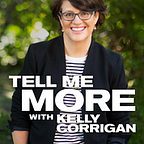Does everything happen for a reason?
Looking at how we respond to the terrible fact that hard and horrible things happen to perfectly lovely people
30 million people in 50 different countries bought a copy of 2006’s The Secret and in so doing, expressed a hope — maybe even a need? — that a new reality was ours for the imagining, including:
“…eradicating disease, acquiring massive wealth, overcoming obstacles, and achieving what many would regard as impossible.”
The rhyming mantra the book promotes is “ask, believe, receive.”
Let me say, in terms of our interior lives, I believe that thinking more about people you love and what you are grateful for will skew a day to the positive, and feeling good more than feeling bad is a valid and profound life goal.
But, if prayers or positive thinking could save a person, if things actually happened for a reason, my friend Liz Laats above would still be alive in her kitchen where her good and hilarious children would be begging her to make her noodles and special sauce. And my friend Kate wouldn’t be deep into year five as a stage 4 colon cancer patient.
I believe that meaning is made, not found. And I believe this is good news indeed because this puts us back in the locus of control where we decide what to make of our realities.
In fact, here’s my mantra: we live in our heads; make it nice in there.
When I called Kate about this, we hit record and made my first podcast. Kate is a professor at Duke, a Canadian with huge dimples who married her high school sweetheart, the author of more than one New York Times bestseller and a super popular podcaster.
You should definitely listen to the whole conversation. Here are some of my takeaways:
- Pain comes to everybody. All our specialness can’t exempt us from suffering. [That should make us much nicer to each other.]
2. When tragedy hits someone you love better to listen more and talk less.
3. There’s no cure to being human; precarity is the theater of life.
4. Assume your desperate desires are the same as your neighbors and let that knowledge teach you who they are and what they need.
5. Prayer is not a formula. It’s a lifeline to each other.
6. Your actions, efforts, and kindness matter, even if they don’t guarantee an easy life.
7. Sometimes the very sick lie to the people who love them so we can feel okay, but that positivity can be exhausting.
8. We are heat seeking missiles for narrative. As we turn chaos into story, we must be careful not to confuse reward with gift.
9. And finally, we come apart all the time, but even an incomplete life story where the hero dies in the end can be beautiful.
A few references you might want to check out:
Kate’s opening salvo to the world came in an Op-Ed that asked us all to think through the links we make between chaos and logic.
Kate and I both gushed about a brilliant and important empathy-on ramp of a book called Far From The Tree by Andrew Solomon.
I have also been on Kate’s podcast, Everything Happens, and she has many seasons-worth of episodes that are well worth your time.
Kelly Corrigan is the author of four New York Times bestsellers, the host of Tell Me More on PBS and the podcast Kelly Corrigan Wonders.
